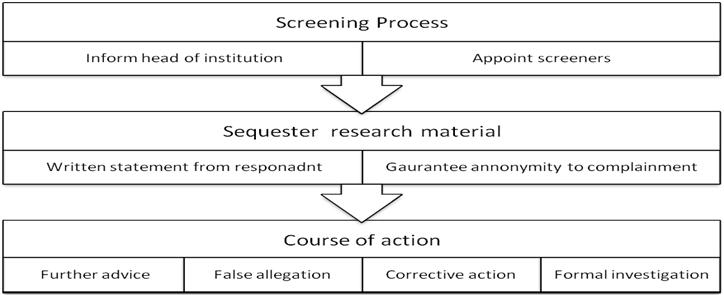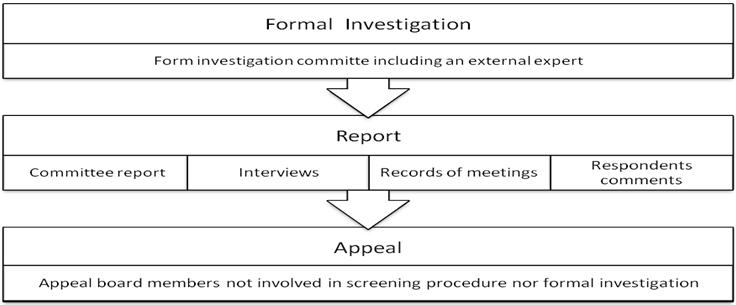This article will demonstrate on how to respond and how to conduct an investigation of alleged research misconduct.
Each institution should have a declared policy and written procedures dealing with research misconduct which are activated once an allegation of research misconduct is reported. However, it is advisable to apply this code of practice to the rather serious spectrum of research misconduct (see previous edition of EJS) especially those characterized by deception for personal gain such as data fabrication, data falsification and plagiarism.
Most investigational approaches use a two-stage approach. An initial screening phase which may be followed by a formal investigative phase if the screening phase indicates to the presence of research misconduct.
Phase One

The screening phase should adopt a step wise approach involving the three levels of management when dealing with research misconduct complaints. The first level of management in university based institutions will include the head(s) of department, the next in line will be the dean of the institution, and the third level will be the president f the university itself.
Initial allegations should be made to the head of the department and to the individual to whom the head of department is directly responsible (Dean) who may nominate another appropriate individual to act on his or her behalf. The head of the department and a senior member of the department (not directly or indirectly related to the incident) would act as screeners of the research misconduct incident.
The complainant must be guaranteed anonymity and allowed to have a representative present at all interviews during the screening and formal investigation. The head of the institution must be informed of the allegations, all research material should be collected and sequestered and a written statement sought from the respondent (accused).
The screeners will then consider the available evidence and the written statement (response) from the accused and decide to pursue one of the following courses of action: 1. Seek further advice.
2. Consider the allegation to be unfounded and dismiss the complaint. If the allegation is deemed to be malicious, the head of the institution may `invoke disciplinary action against the complainant.
3. There is some substance in the allegations but the matter does not warrant a formal investigation. Some corrective action may be recommended. In such situation, the respondent (accused) has the right of appeal.
4. There is sufficient substance in the allegation to initiate a formal investigation of the complaint.
Phase Two

The formal investigation is only initiated if the screening process deems it necessary. The objective of phase two is to seek answers to the following questions:
1. What are the relevant facts?
2. Has research misconduct been committed?
3. If so, who is the responsible person or persons?
4. What is the seriousness of the misconduct?
The Investigation Committee
The committee should consist of at least three people; one of whom (at least) is from outside the institution and a recognized expert in the field under investigation. None of the members of the committee should have conflicts of interest with the respondent or the case in question. The committee members must have some experience in examining evidence, interviewing witnesses and conducting an investigation.
The complainant and respondent (accused) must be notified in writing that a formal investigation is to be undertaken. The respondent (accused) must be able to object in writing to any individuals appointed to the investigation committee. Accordingly, the head of the institution may decide to replace the challenged person with a qualified substitute.
The Investigation
The investigation will include examination by the committee of all documentation, including computer disks, materials, proposals, publications, correspondence and memoranda. Interviews will be conducted with all individuals involved in making the allegations and other individuals who have information regarding key aspects of the allegations. A word for word record of these interviews must be prepared by the secretariat and approved by interviewer(s) and interviewee(s) to ensure factual accuracy; this record must be included as part of the investigation report.
The Report
The report must state how the investigation was conducted, describe how and from whom the information relevant to the investigation was obtained, state the findings and explain the basis for the findings. Agreed word for word reports of all interviews must be included in the report as an appendix. The respondent (accused) or respondents against whom the allegations have been made will be given a copy of the evidence considered by the investigation committee and a copy of the report. The respondent (accused) must be given an opportunity to comment upon the report in writing. The respondent (accused) may request a meeting with the investigation committee to allow the respondent (accused) to challenge statements which he or she believes to be unsubstantiated. A record of this meeting with the respondent's (accused) comments on the report shall form part of the investigation report and will be provided to the head of the institution. The investigation committee will report its findings to the head of the institution and the head of department of the person against whom the allegations have been made.
Outcome
Should the allegations be proved, the head of the institution with the appropriate person (e.g. head of department or research group) should decide what action needs to be taken. This may include informing relevant authorities such as the president of the university, the appropriate professional bodies, the relevant grant awarding body, editors of all journals in which the respondent has published articles especially those related to the research misconduct. Action may also be taken to revoke a degree or other qualification obtained wholly or partly through misconduct in research relevant to that degree or other qualification. Other disciplinary action may be warranted. Even if the respondent resigns from the institution before completion of the investigation, the investigation must be completed by the institution and a report submitted to the head of that institution.
Appeal
The respondent (accused) may appeal following either the screening or following investigation. An appeal board should be appointed within a short set time from the receipt of an appeal by the respondent (accused). There should also be a time limit for completion of the appeal. The appeal board will consist of two or more individuals who were neither members of the initial screening procedure nor of the investigation committee. The head of the institution will notify the respondent (accused) of the proposed appeal board membership. The appeal report must state how the appeal was conducted, describe how and from whom further information was obtained, state and explain the basis for the findings. The head of the institution will then take appropriate advice and decide on the basis of the appeal report whether to endorse, amend or overturn the conclusions of the screening or the investigation. The head of the institution will notify the respondent (accused) in writing of the outcome of the appeal board and will provide a copy of the appeal report and evidence considered by the appeal board. The decision of the head of the institution shall be final. Manuscript resources
Committee for Publication Ethics (COPE): www.pubicationethics.org
International Conference of Harmonization: www.ich.org


